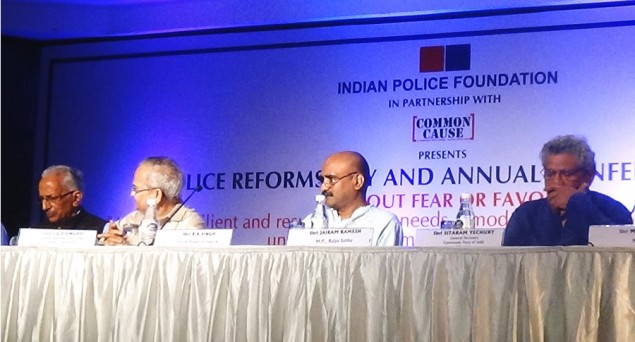'Police reform can't be achieved without political and judicial reforms'

Ghazanfar Abbas, IndiaTomorrow.net,
New Delhi, Sep 23: The existence of a civil society and development are dependent on rule of law enforced by the police that play a key role in criminal justice system. But what if the police are not able to perform their duty due to either political pressure or apathy of judiciary?
Even 11 years after the historic directions issued to the central and state governments by the Supreme Court, this was the main concern of some eminent jurists, parliamentarians, former Police officers and journalists who had gathered here on Friday to discuss the need of a modern & people-centric police committed to rule of law. The event was jointly organized by Indian Police Foundation and Common Cause. And the deep concern of the speakers on the state and misuse of police by successive governments showed that the SC directions for police reform were hardly acted upon.
CPI-M General Secretary and former Rajya Sabha member Sitaram Yechury said that if people want a police force that works without fear and favor then political and judicial reform is must.
"Without enforcing the rule of law, no democratic civil society can exist. Yes, Police reform by itself is very important but Police reform by itself can't succeed. If you really want police reform, it has to be accompanied by political and judicial reform," Yechury said.
"As long as the tenure and stability of the posting of police officers are controlled by the political masters, how would you expect efficiency in them," he questioned.
Sitaram Yechury speaking at annual conference of Indian Police Foundation at India International Centre on 22nd Sep, 2017. (Photo - IndiaTomorrow.net)
Confessing that the biggest obstacle in independent working of police in police reform has always been political parties, he cited some recent cases.
"You can take Baba Ram Rahim's case where direct political interference happened. We know about the recent killings of journalists like Santanu Bhowmick and Gauri Lankesh as well the killings of Narendra Dabholkar, Govind Pansare and MM Kalburgi. Besides this, the armies of Gau Rakshaks are going around taking law in their own hands. It requires central government's initiative in order to ban such groups," he said.
Senior Supreme Court advocate KTS Tulsi emphasized on independent police probes.
"We need to ensure the independence of investigating officer in the context of criminal trials. The investigating officers should be free from any pressure from the seniors of the department as well as from outside," Tulsi said.
"Today, the situation is very bad in the country as scores are being settled in the streets on the slightest provocation and an impression being given by the political leadership that it is all right. For the protection of something, you are entitled to kill any. It is the job of the government to ensure that the peace prevails," he averred.
Advocate KTS Tulsi speaking at annual conference of Indian Police Foundation at India International Centre on 22nd Sep, 2017. (Photo - IndiaTomorrow.net)
He advised formation of a parliamentary forum for police reform. He also stressed use of technology to improve performance of police.
"Every police station should have mobile forensic lab, so that evidence can be collected without loss of time. It must be equipped with an interrogation room which has equipped with two cameras where police record the statement of every suspect and witness," he said.
Former IPS officer Prakash Singh, who is also chairman of the Indian Police Foundation, said, "We want police reform for better security of the people, better protection for the women and governance to ensure that human rights are upheld and the rule of law is enforced in all circumstances."
Singh said that judiciary, government and people - all have responsibilities to ensure police reform.
"When SC issued directions, was it not also incumbent and necessary to ensure its compliance," he asked.
Prakash Singh speaking at annual conference of Indian Police Foundation at India International Centre on 22nd Sep, 2017. (Photo - IndiaTomorrow.net)
In September 2006, the Supreme Court had delivered a historic judgment in Prakash Singh vs. Union of India instructing central and state governments to comply with a set of seven directives for police reform that included: 1.Constitution of a State Security Commission (SSC) to ensure that the state government does not influence or pressurize the police; 2. Setting up of a Police Establishment Board to decide on transfers, postings, promotions and other service related matters of police officers and 3. Setting up of a Police Complaints Authority at state and district level to inquire into complaints against police officers in cases of serious misconduct.
While commenting on the government's tall talks about development plans, he asked how it can succeed without maintaining law and order.
"Government talks about ‘Sabka Sath Sabka Vikas' that we hear almost every day. It also talks about economic development but it requires a foundation that is stable law & order. If you don't have law & order in the country, forget about the economic development," he said.
He also urged the people that if they want police reform they have to articulate their views so that they can reach the corridors of parliament.
Former Supreme Court judge Justice GS Singhvi, Ramachandran, president of Indian Police Foundation, Union minister and former IPS officer RK Singh, senior Congress leader Jairam Ramesh, senior journalist Manoj Mitta, Vipul Mugdal, Director of Common Cause, Navneet Sikera, IG (UP women power line), OP Singh, Director General, CISF and Sanjay Beniwal, Special Police Commissioner, Delhi Police also featured the conference.









You might like